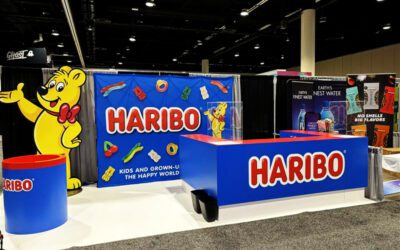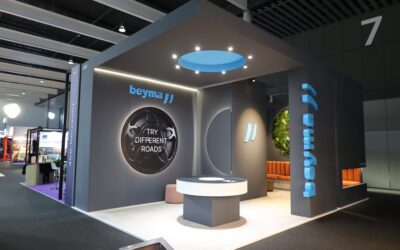
As an exhibitor, understanding what motivates visitors to stop by your booth and how they perceive their experience is essential to building stronger relationships, generating leads, and improving future trade show appearances.
An entry survey helps you gauge visitor expectations, while an exit survey provides feedback on their overall experience with your booth and brand. When done right, these surveys can give you the insights needed to optimize future booth strategies and make sure you’re meeting your audience’s needs.
Here’s a guide on how to create the perfect entry and exit surveys for your booth visitors.
Step 1: Define Your Survey Objectives
First, determine the specific information you want to gather. Whether you’re looking to understand visitor expectations, gather feedback on product demonstrations, or learn how well your booth staff engaged with attendees, your objectives will guide the questions you ask.
Example objectives for an exhibitor:
- Entry Survey: Understand what products or services visitors are interested in and why they were drawn to your booth.
- Exit Survey: Get feedback on the booth experience, staff interactions, and whether your exhibit delivered on expectations.
Step 2: Design Entry Survey Questions (Closed-Ended)
The entry survey should consist of quick, closed-ended questions that allow you to gather useful insights without taking too much time. These questions help you understand visitors’ awareness of your brand, their initial sentiment, and their intentions.
Key Closed-Ended Questions for Entry Surveys:
Reason for Visiting: “What brought you to our booth today?”
-
- Options:
Curiosity about your products/services
Recommendation from a colleague
Pre-scheduled meeting
Other (please specify)
- Options:
Brand/Product Awareness: “Before today, how familiar were you with our brand?”
-
- Options:
Very familiar
Somewhat familiar
Not familiar at all
- Options:
Perceived Value of Engagement: “How valuable do you expect this engagement to be for your business needs?”
-
- Options:
Extremely valuable
Somewhat valuable
Neutral
Not very valuable
Not valuable at all
- Options:
Brand/Product Sentiment: “What is your current perception of our brand?”
-
- Options:
Very positive
Somewhat positive
Neutral
Somewhat negative
Very negative
- Options:
Brand Preference: “Which of the following best describes your preference for our brand compared to competitors?”
-
- Options:
Strongly prefer your brand
Slightly prefer your brand
No preference between your brand and competitors
Slightly prefer competitors
Strongly prefer competitors
- Options:
Brand Affinity: “On a scale of 0-10, how likely are you to recommend our brand to others?”
-
- Scale: 0-10
Purchase Intent: “What is your purchasing timeline?”
-
- Options:
0-3 months
3-6 months
6-9 months
9-12 months
12-18 months
Not planning to purchase
Other (please specify)
- Options:
These closed-ended questions allow you to efficiently capture key insights before visitors explore your booth, helping you tailor your interactions based on their initial responses.
Step 3: Design Exit Survey Questions (Mix of Closed- and Open-Ended)
For the exit survey, a combination of closed- and open-ended questions gives you both quantifiable data and in-depth feedback. This approach allows you to capture visitor sentiment, assess booth performance, and identify areas for improvement based on both structured and free-form responses.
Key Exit Survey Questions (Closed- and Open-Ended Mix):
Overall Satisfaction: “How would you rate your overall experience with our booth today?”
-
-
- Options:
Excellent
Good
Average
Poor
Very poor
- Options:
-
Product or Service Feedback: “Which product or service at our booth interested you the most?”
-
-
- Options:
[List of Products/Services]
None
- Options:
-
Booth Staff Interactions: “Can you describe your experience with our booth staff? Were there any standout interactions?”
Product or Service Feedback: “What made this product or service stand out to you?”
Engagement Value: “How valuable was your engagement with our booth for addressing your business needs?”
-
-
- Options:
Extremely valuable
Somewhat valuable
Neutral
Not very valuable
Not valuable at all
- Options:
-
Suggestions for Improvement: “What could we improve about our booth for next time?”
Brand Affinity: “On a scale of 0-10, how likely are you to recommend our brand to others?”
-
-
- Scale: 0-10
-
Brand Sentiment: “How did your experience today impact your perception of our brand?”
-
-
- Options:
Significantly improved
Slightly improved
No change
Slightly worsened
Significantly worsened
- Options:
-
Future Considerations: “What would make you more likely to engage with our brand after this event?”
Purchase Intent: “How likely are you to consider purchasing from us after this event?”
-
-
- Options:
Very likely
Somewhat likely
Neutral
Somewhat unlikely
Very unlikely
- Options:
-
By mixing closed-ended questions that offer quantitative insights with open-ended questions that capture qualitative feedback, you can gather a balanced view of visitors’ experiences. The closed-ended questions give you measurable data, while open-ended responses provide deeper context, allowing you to refine your booth strategy and improve visitor engagement in the future.
Step 4: Keep It Short and Easy to Complete
Trade show attendees are often pressed for time, so your surveys should be short and easy to complete. Aim for no more than 5-7 questions on the entry survey, and keep it less than 5 minutes. The exit survey can be a bit more in depth with 8-12 questions, and should take no more than 5-7 minutes – although some industries, such as eSports and gaming can be longer. However, if your survey is too long, visitors are less likely to finish it.
Example Formats:
- Rating Scale: “How would you rate the quality of our booth demonstration?”
- Multiple-Choice: “What aspect of our exhibit was most appealing to you?” (e.g., Product displays, Interactive demos, Staff engagement)
Step 5: Timing Is Everything
Timing your surveys correctly is key to gathering the best feedback:
- Entry Survey: Use this survey right as visitors approach or enter your booth. This can be done via a QR code or a quick digital survey on a tablet at the booth entrance.
- Exit Survey: For the exit survey, you can encourage visitors to fill out the survey before they leave by offering an incentive, such as entry into a raffle or a discount on future purchases. Also consider sending a follow-up email the day after the trade show while the experience is fresh in their minds, but recognize that response rates are likely to drop from 70% on the show floor down to 5% via email.
Step 6: Analyze and Act on the Feedback
Once your surveys are complete, it’s time to dig into the results. Analyze the data to identify trends and areas where your booth or staff performed well, as well as areas for improvement.
Key Metrics to Look At:
- Booth Engagement Levels: Look for patterns in what drew visitors to your booth and what kept them engaged.
- Staff Performance: Identify how well your team connected with visitors and whether they effectively communicated your message.
- Visitor Satisfaction: Track how satisfied visitors were with their overall experience, including product information and demonstrations.
Step 7: Use Feedback to Improve Future Exhibits
The insights you gather from both entry and exit surveys will help you continually refine your booth strategy. Use the data to:
- Enhance product displays and demonstrations.
- Train booth staff based on visitor feedback.
- Adjust your messaging to better align with what visitors are looking for.
By acting on this feedback, you’ll ensure your booth delivers a better experience at future trade shows, increasing the likelihood of repeat visits and new leads.
The Takeaway
Creating the perfect entry and exit survey for your booth visitors is about more than just gathering feedback — it’s about understanding your audience and refining your exhibit to meet their needs. By asking the right questions at the right time, you can create a booth experience that resonates with visitors and drives meaningful results for your brand.


